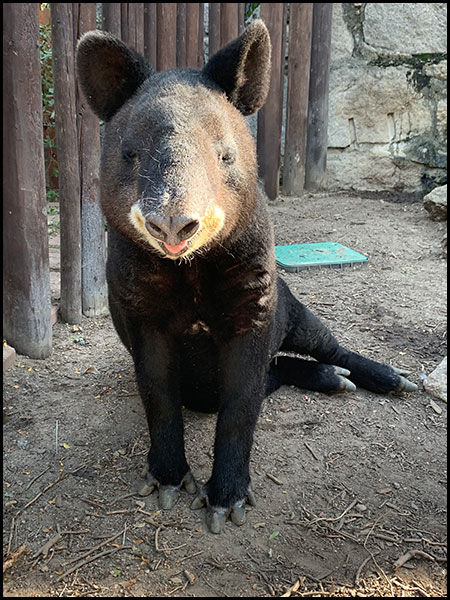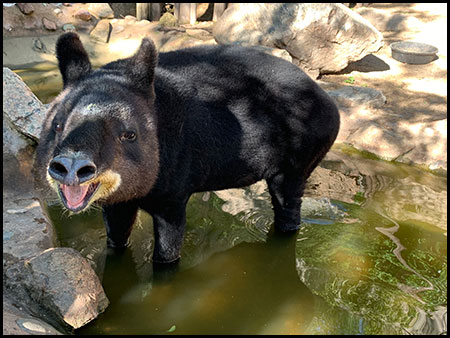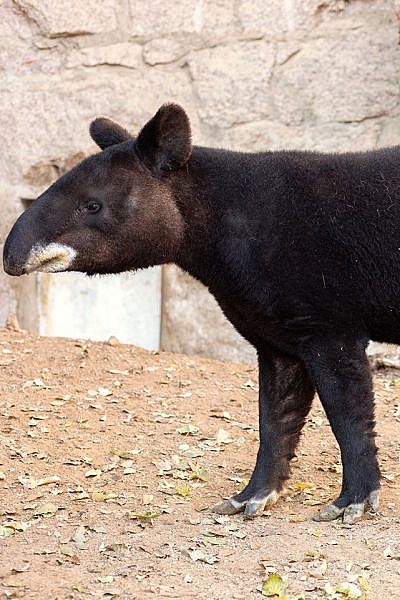Cofan, our 17-year-old male mountain tapir, is recovering from having a kidney removed in mid-February. In December 2020, his keepers noticed he was starting to act unusually and that his symptoms were progressing quickly. He was uncoordinated, was not shifting to his outdoor yard, and was eating less and losing weight.

“Cofan is normally eager to participate in training and has a healthy appetite,” said Michelle Salido, lead tapir keeper at Cheyenne Mountain Zoo. “When we noticed he wasn’t himself, we started working to find out why, and ultimately discovered our guy was dealing with kidney stones that had damaged his kidney to a point that he’d be better off long-term without it.”
There are only seven mountain tapir in human care in the United States, two of which live at CMZoo. Because mountain tapir are so rare, keepers rely on their experience with Cofan and Carlotta, our 26-year-old female mountain tapir who lives with Cofan, to diagnose any issues. Tapir’s closest relatives are horses and rhinos, so sometimes knowledge of these other species can help the team care for them.
“On the inside, tapir are basically miniature horses,” said Salido. “Because their anatomy is so similar, we knew we could work with equine specialists to help him.”
Cofan’s relationship with his keepers and previous husbandry training helped the team diagnose and treat his condition. Cofan voluntarily participated in diagnostics, including x-rays, blood work and ultrasounds. With his keepers’ love and endless chin scratches as rewards, Cofan didn’t need to be sedated for any of the tests that helped diagnose his kidney disease.
“Our ultrasounds showed that he had some kind of kidney abnormality that we needed to further investigate,” said Dr. Jon Romano, head veterinarian at CMZoo. “We reached out to Colorado State University’s Veterinary Teaching Hospital and put together a team of specialists that ultimately helped save Cofan’s life. This is the first time this surgery has ever been done for this species, and that was only possible for Cofan because of the collaborative relationship we’ve built with CSU over the years.”
Dr. Matt Johnston, CSU veterinarian and Associate Professor of Avian, Exotic, and Zoological Medicine, was part of an 11-person CSU team of equine specialists, radiologists, anesthesiologists and surgeons that quickly made the trip to help Cofan.
CMZoo and CSU teams identified the kidney stones that were causing the enlargement and damage to Cofan’s left kidney, and went right into surgery.
“We tend to think of tapirs as being similar to horses, and our equine team was able to contribute important expertise to Cofan’s case,” Dr. Johnston. “The pulling together of this type of team happened because of the long-standing working relationship with CSU, which has been mutually beneficial for both CSU and CMZoo.“
As an ambassador for his critically endangered species, Cofan’s charming nature helps people fall in love with tapir, and learn how to help protect his wild counterparts, of which fewer than 2,500 remain in their native habitat. This veterinary case will also help future tapir in human care and possibly in the wild.
“Aside from being so easy to fall in love with, Cofan is continuing to help his species by helping us learn more about how to care for mountain tapir,” said Salido. “What we learn from this case will be shared with other tapir keepers and organizations that monitor wild tapir, with the hope that other tapir can avoid or overcome similar issues.”
Cofan isn’t out of the woods yet. But, his care team is right by his side as they have been all along, and they’re cautiously optimistic. Cofan has been urinating regularly and eating better than he was before surgery – both good signs he’s on the mend.

Cofan’s care team is adjusting his diet to help him hopefully avoid developing stones in his remaining kidney, which should be able to sustain him well by itself, as long as it stays healthy. For the time being, he’s receiving subcutaneous fluids voluntarily as needed, so he’s nice and hydrated as he heals. Again, chin scratches and love are the rewards Cofan needs to receive these treatments voluntarily without sedation.
“He’s doing so great, considering he’s been through major surgery and is still recovering from feeling unwell before the surgery,” said Salido. “We’re taking turns sitting with him while he gets treatments, which take about two hours. Not only does he get the fluids and medications he needs, but it means we get to sit with him and give him lots of love and scratches for hours on end, which I think all of us, including Cofan, are really grateful for.”
Mountain tapir, from the Andes Mountains in Colombia, Ecuador and northern Peru, are one of four species of tapir. Due to habitat loss, mountain tapirs are critically endangered. CMZoo staff, thanks to support from Zoo members in our annual Member Conservation Grant Vote, work diligently to save mountain tapir and their habitats south of the equator. In previous years, those grants have funded field research that is led by the Andean Bear Foundation, with support from Smithsonian, LA Zoo, and other partners. As part of these grants, Salido and other CMZoo staff members have traveled to Ecuador to track and attach GPS collars to wild mountain tapirs, and assist with health monitoring and mountain tapir education programs in the region.
The tracking research is critical, given the limited number of tapirs left in the wild and the lack of available data about them. The team’s goal is to present complete data to organizations that can place land protections in the areas where tapirs most frequently roam.
Keepers and CMZoo vet staff are keeping close eyes on Cofan and monitoring his progress as he heals.

